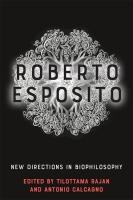'A compelling collection of essays that attests to the extraordinary versatility of Roberto Esposito's thought, and the generosity of his engagement with other thinkers. Attentive to his diagonal and dialogic philosophical approach, the authors in this volume provide a welcome and stimulating expansion of current Esposito scholarship.' Diane Enns, Ryerson University Essays by internationally recognised scholars on central themes and questions in Roberto Esposito's thought This collection addresses Esposito's long-standing engagement with early modern philosophy, philosophy of biology, biopolitics, the impolitical and the impersonal as well as significant dialogues with contemporary philosophers like Gilles Deleuze, Jacques Derrida, Simone Weil, Jean-Luc Nancy and Maurice Blanchot. A new essay by Esposito himself reveals the importance of philosophical sources and ideas that condition his thinking, especially outside and beyond the dominant biopolitical interpretative framework that has come to mark his reception in the English-speaking world. Readers are invited to reposition Esposito's thought and explore the interdisciplinarity and unique methodology of his whole corpus. Tilottama Rajan is a Fellow of the Royal Society of Canada and Canada Research Chair and Distinguished University Professor at the University of Western Ontario where she teaches in English and at the Centre for Theory and Criticism. Antonio Calcagno is Professor and Chair of Philosophy at King's University College at the University of Western Ontario. He also teaches at the Centre for Theory and Criticism. Cover image: Ophiodea-Schlangensterne from Kunstformen der Natur (1904) by Ernst Haeckel. Original from Library of Congress. Digitally enhanced by rawpixel Cover design: riverdesignbooks.com ISBN 978-1-4744-8033-8 Barcode

